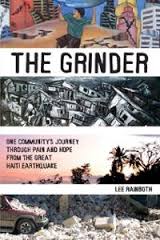Although the town was destroyed by the 7.1 quake on January 12, 2012, there was little injury or loss of life. The true impact of the disaster came when family and friends who were working or at school in Port Au Prince returned with the horrific descriptions of the disaster there.
Rainboth begins his story in Mizak where the population lost mainly their houses and possessions. He is particularly adept at describing the feeling of helplessness that pervaded the town’s people in the quake’s aftermath. With the communications infrastructure severely damaged the town had no way to contact their families in the larger cities and the rubble on the roads made travel difficult. Eventually, some of the town, including Mr. Rainboth, ventured into Port Au Prince and saw what many of them described as Hell itself. At this point, the story could have become formulaic with individual stories of destruction and loss but the author chooses to tell us about how people rose from the rubble and worked with their own meager resources to return to normalcy, or some semblance of it.
THE GRINDER is particularly effective in highlighting the shortcoming of aid efforts primarily because of a “one response fits all” mindset that does not take into consideration the culture of the people or their need to be involved in their own rescue efforts. Lumping the entire population, especially by church based volunteer groups, as “the least of my brethren” immediately sets the people of Haiti into a subservient position and the aid becomes little more than a handout. Mr. Rainboth eloquently describes how each of the town’s people carry the wounds of that day while carrying on with their daily lives. They may not have built new edifices but they sing and play soccer with the newfound knowledge that they overcame a violent catastrophe because they came together as neighbors.
THE GRINDER is a well-written description of how a natural disaster effects individuals rather than entire societies. Rainboth is a resident of Haiti and has been so for several years before the earthquake; his story is an insider’s look at how other countries responded to Haiti’s needs and why they fell short.
Reviewed by Ed Bennett for Indie Reader

